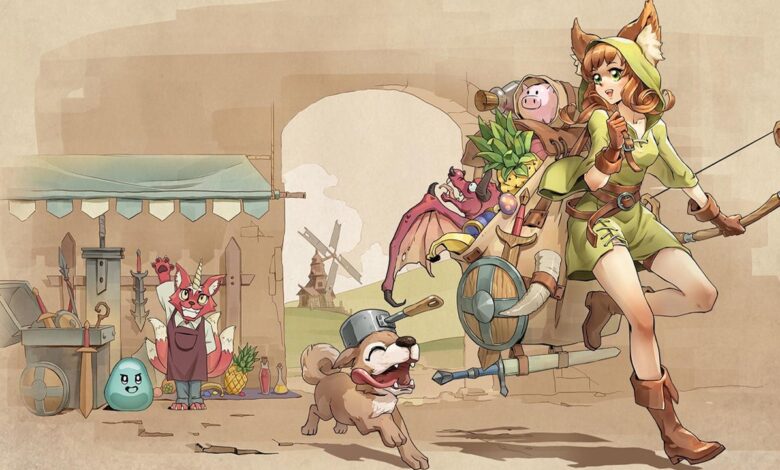Backpack Battles Early Access Review

I’d be lying if I said there wasn’t a certain satisfaction that comes from the Tetris-like puzzle of inventory management in some games – hell, a whole game based around that idea, Save Room, became its own hit. Meanwhile the autobattler genre that has exploded in recent years hits similar notes, providing the joy of seeing your planning and preparation pay off in PvP. The bite-sized indie joint Backpack Battles combines these two ideas, pitting your organizational skills and wits in creating RPG-like character builds against others in fast-paced one-on-one matches. After a dozen hours with its Early Access release, I’ve seen the seeds of something great in that concept, with the potential to grow into something unique and impressive. But as it stands now, Backpack Battles is light on content and variety – it’s very much an Early Access game, with an emphasis on early.
Backpack Battles Early Access Gameplay Screenshots
The outset of Backpack Battles is quite straightforward: You select one of the four currently available classes – Berserker, Pyromancer, Reaper, or Ranger – then jump into ranked or unranked matches (the main difference being that ranked contributes to your classes’, well, rank). The goal of each run is to win 10 battles before exhausting your five lives, and you can either take your trophies and leave (the currency you earn from playing) when you do so, or go into a survival phase for an extra set of rounds for the chance to earn even more trophies and boost your class rank further. So far, this is the only mode offered, and while it is a digestible setup to let you focus on the more interesting mechanics of building your character throughout a run, it also means how you play is fairly limited.
Cramming as much gear into your bags as possible is part of the fun.
Where Backpack Battles shines is in the inventory organization mechanics that make up the bulk of what you’ll be doing. Light RPG elements blend with the self-induced puzzle of trying to fit all your best gear into limited spaces of your grid-based bags. Before every round, you have the opportunity to purchase interesting items from a randomized shop and equip them by fitting each into your backpack. That pack is constructed with several interlocking satchels and pouches you can freely reconfigure, which is important because gear comes in all sorts of shapes and sizes. You can (and must) purchase backpack expansions while balancing spending on weapons, armor, food, and accessories that all contribute to you actually winning battles. But not only is cramming as much gear into your bags as possible part of the fun, several pieces also react to others based on proximity. That’s how you essentially create “builds” for your character during a run, working out how best to stack item effects relative to each other or make them evolve into much stronger ones you cannot simply buy from the shopkeeper.
For example, as a Pyromancer, you’ll earn flames that you place into your bag to improve your attacks, but placing a lump of coal in an adjacent slot will turn the coal into a flame gem the following round, which you can then attach to weapons or armor to provide buffs in combat. A more significant tactic deeper into a run would be to place flames next to a set of Holy Armor to evolve it into Sun Armor, which then stacks on more effective buffs for the Pyromancer class. Working with the limitations imposed by bag space and investing in certain item types from round to round to make yourself even stronger later on is a tricky puzzle I enjoyed working out.
Then there are a handful of subclasses for each main class that open up later in a run, which offer new ways to further strengthen your character. A favorite of mine is the Firebender subclass that gives you an equippable gear piece (which is a very cute reference to Calcifer from Howl’s Moving Castle) to amplify the attack speed and power of all fire-based items in its surrounding slots. This way, that Burning Sword and Molten Spear I upgraded in earlier rounds are further strengthened if I can figure out how to get them next to it – and with the compounding effects of other accessories that can either boost my armor rating, inflict debuffs on the enemy, or even give me a second life mid-combat, I could become nearly unstoppable.
With each run, you’ll see a ton of variations on fascinating concepts like this, which ultimately feels like a clever crafting element woven into the inventory organization challenge. This means you’ll be spending most of your time in the shop, racking your brain as you try to weasel your way into fitting a weapon that takes four linear slots alongside a shield that takes up two-by-two, then also finding room for that Y-shaped Phoenix for revives alongside healing food items like an L-shaped banana. Sometimes rotating weirdly shaped gear isn’t enough and you just need to break it all down to completely rearrange your setup. It’s an enjoyable process that tickles the part of your brain that fires off in other games like Unpacking or just neatly fitting a bunch of your stuff into a closet. I saw one Steam review refer to Backpack Battles as the best banana-flipping simulator, and you know what, there’s truth to that.
Backpack Battles currently comes up short in its incentives to keep going.
Since this is an autobattler, the actual combat is out of your hands, with attacks and abilities being fired off on their own based on what you have in your inventory. You simply jump into a matchup and watch it all unfold. How much stamina the weapons in your inventory take up, your stamina recovery rate, the way your character builds armor or heals up, the conditions for which status effects are activated, and so on can all affect who comes out on top. The more you read the item descriptions, the more you realize how deeply their granular mechanics intertwine with each other, making this a thoughtful take on choosing gear and creating builds. That prep is important too, because it’s tough to really grasp what’s going on in combat since fights go by very quickly, lasting roughly 10 to 15 seconds per round (although you can read the battle log to see a detailed breakdown), and the limited, stilted animations don’t really express what is happening.
Michael Higham’s 10 Favorite Indie Games
These are my personal favorites. Don’t hate, appreciate.
For all its great ideas and clever execution, Backpack Battles currently comes up short in its incentives to keep going, not letting these interesting systems truly sing. Trophies can be spent on new cosmetics for each class, which is fine, but doesn’t exactly push me to keep playing once I’ve seen what the different builds have to offer. And with only ranked or unranked matches, you start to go through the same motions a little too quickly once you’ve tried out each class. Preparing for opponents isn’t as dynamic as I hoped from run to run, as you basically just build the best character you can based on the items offered to you and hope it’s good enough for whoever you face, regardless of what they are doing. After about three or four hours, I felt I had already hit the plateau of what the Early Access launch offered. That’s not so bad for a fast-paced autobattler where you can get in and out of matches quickly, but I can’t help but feel it’s lacking a larger structure to bring it all together.
Of course, it’s always hard to judge a game in Early Access, as hopefully more modes, classes, and other options to shake each run up will arrive in future updates. What’s currently available is a great starting point, it just needs to be ushered in the right direction to reach its full potential. The public roadmap shows promise, and I’ve at least been convinced to keep tabs on Backpack Battles as it gets closer to its final build, but at the moment it’s probably worth waiting until it’s a little further along before really diving in.
Verdict
Backpack Battles has a strong foundation, smartly mixing the satisfying puzzle of inventory organization with some clever RPG elements and autobattler combat. The systems and ideas in place offer something refreshing, although its current barebones state leaves a lot of potential on the table. As it stands, there’s a noticeable lack of content and few reasons to come back to it after you’ve seen everything once. What’s there is enjoyable, though, with plenty of room to grow, and my time with the Early Access build of Backpack Battles has me excited to see it do just that.


